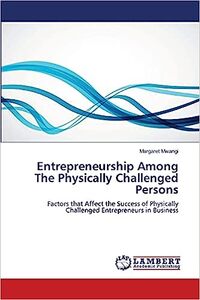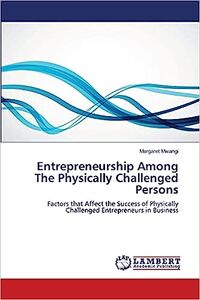- Έκδοση
- Βιβλίο έντυπο
- Mwangi, Margaret
- First edition
- Margaret Mwangi
-
Saarbrücken, Germany:
LAP, Lambert Academic Publishing, 2013
- 95 pages : tables ; 22 cm.
- 978-3-659-35837-1 (paperback).
- Includes bibliographical references
- Original: Βιβλιοθήκη Πανεπιστημίου Κύπρου . - Rules: RDA
-
-
According to ILO 2008 challenged people worldwide face barriers to formal employment. One possible solution for challenged people with entrepreneurial skills is self-employment. The establishment and expansion of small businesses by persons with disabilities, however, tends to be restricted by limited access to credit markets and by inadequate business training. Limited by their physical conditions, the areas of employment are limited for persons with disabilities. They do not have many options. Sometimes, even if they get a job, they are found to be unsuitable for it and have to give up shortly, and are back to the status of not working. Various studies have revealed that Kenya has a large population of physically challenged people who have shown great interest in entrepreneurship by engaging in owning, managing and running enterprises (Kenya National Survey on persons with disabilities 2008). People with disabilities (PWD) make up 10 percent of the total population of Kenya, WHO (2006).There should be inclusivity in entrepreneurship; implying that no member of the society should be excluded in terms of starting business on the grounds of disability.
-


